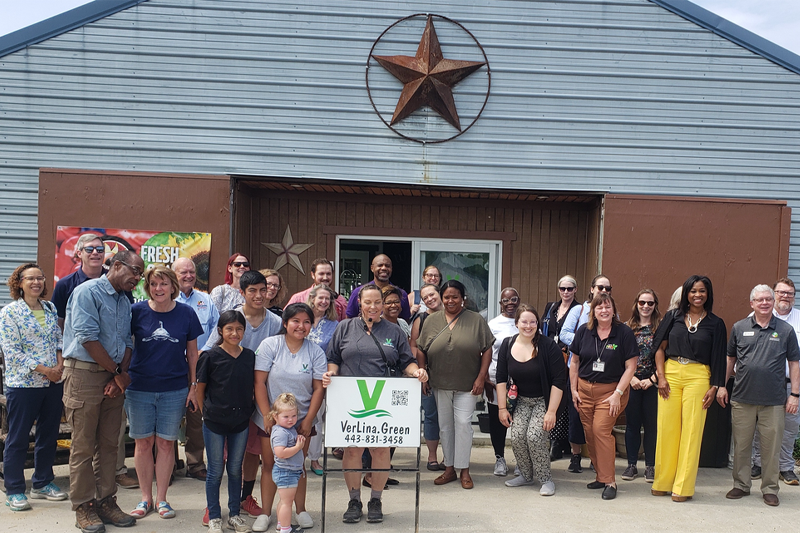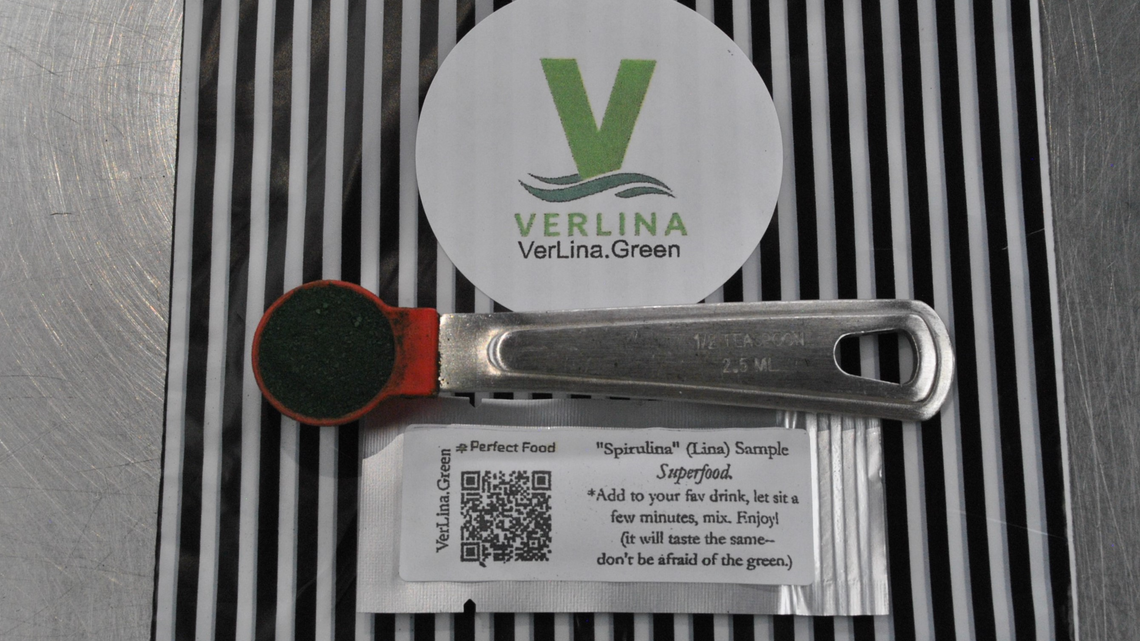TEDCO’s ARR Grant Helps Maryland Farm Repurpose Old Poultry Houses into Thriving Agriculture and Superfood Business

The poultry industry is a major component of Maryland’s economic activity, particularly in the Eastern Shore. As significant as the poultry sector is, it also comes with a major challenge – vacant, unused poultry houses. Major distributors often cut contracts with farms that are old or outdated, leaving the farmer with an unused house, a high mortgage and lost income.
When Jeanne Scharf, owner of Farm to Fork Fresh Farm, found herself in this situation, she refused to let her poultry houses sit and collect dust. Together with Tom Cropper of Croppers Farm, Roxanne Wolf of Shore Gourmet and other collaborators, they decided to repurpose Scharf’s facilities to be able to grow nutraceuticals and produce.
The first step was to figure out a process for abating potentially harmful bacteria from the houses, which the team did with help from the University of Delaware. The team then turned to TEDCO’s Agriculture and Rural Rebuild (ARR) Challenge to get further support for the renovation portion of the project – they were one of seven award recipients.
The ARR Challenge launched in early 2021 to support rural and agricultural businesses in Maryland affected by the ongoing pandemic and economic downturn. These grants, which provided funding of up to $200,000, were designed to encourage collaborations among applicants, research institutions and industries. The goal was to not only give Maryland’s agriculture economy a much-needed boost but also facilitate the development of long-lasting technological improvements in the ag-tech field and other rural industries.
Overcoming the challenges of growing spirulina
Cropper, the original grant sponsor, had an interest in growing spirulina and wanted to use it as proof-of-concept for the project. Spirulina is a highly nutritious freshwater blue-green algae that contains abundant protein, vitamins, minerals and antioxidants. In addition, Scharf and Wolf were interested in installing raised beds, hydroponic and aeroponic systems to grow herbs, vegetables and other produce.
Repurposing Scharf’s old poultry houses took considerable work, much of it trial and error. Old dirt needed to be removed and replaced, lighting needed to be redone and a vapor barrier needed to be constructed to help keep out contaminants – and that was before any growing began.
“It’s much different growing spirulina indoors versus outdoors. You need to make sure you have enough space to handle the cultures when they double. You need to know what type of growth media they need and when to add it. The light and heating need to be just right,” said Scharf.
“Jeanne was able to figure that all out, though – she’s a certified ‘Spirulina Whisperer,’” added Wolf.
While the team was also able to establish hydroponic, aeroponic and raised bed systems, the spirulina side of the business has been their primary focus. And with the spirulina growth process nailed down, the team was ready to take on another challenge – freeze-drying.

“Spirulina farmers in the United States mostly sell either fresh or frozen product, which not only has a certain shelf life but is expensive to ship,” said Wolf. “Some sell dehydrated product, but dehydrated removes a lot of the nutrients. Freeze-drying lasts longer, is easier to ship and retains 90 to 95% of the original nutrients. While other countries will freeze-dry spirulina, they often have questionable growing conditions and processing; we wanted to develop a product that we could fully stand behind, reassuring consumers they’re getting the best quality, most nutritious product.”
“To our knowledge, we’re currently the only company in the United States that produces freeze-dried spirulina, and it’s made up the majority of our sales so far, which has been both surprising and exciting,” added Scharf.
In addition to Farm to Fork Fresh Farm, Scharf has since started VerLina, which sells spirulina in fresh, frozen and freeze-dried forms to individual consumers as well as wholesale.
“The freeze-dried spirulina is so easy to mix with your favorite drink or smoothie. The amount of nutrition in just a half a teaspoon is astounding. It’s an especially great way to help your children get nutrients if they’re picky eaters,” said Wolf.
Besides building their operations in Maryland, the team has also been able to help fight malnutrition across the Atlantic. “We recently helped someone set up their own spirulina operation in Kenya, whose population suffers considerably from hunger and poor nutrition. It’s just been incredible for us to be able to help those people.”
Plans for more products
With spirulina production now under their belts, Scharf and Wolf are thinking ahead, with near-term plans to convert another one of Scharf’s old poultry houses into a mushroom-growing facility. They’re also looking into other applications for their spirulina freeze-dried powder, such as producing raviolis, tortillas and even a signature “Sparkling Apple Lini” to provide a healthier alternative to soda.
“This team is truly inspirational, and their success is a testament to why we established the ARR Challenge in the first place,” said Arti Santhanam, Ph.D., executive director of TEDCO’s Maryland Innovation Initiative and lead manager of the ARR Challenge. “Not only was Jeanne able to pull herself out of a difficult situation, but she’s now thriving and sharing her passion to help others.”
“We are so thankful for TEDCO’s support. While we had our fair share of kinks, we’re incredibly excited at how this project has turned out. It’s going to help so many farmers and so many people across the world,” said Wolf. “We’ve been able to participate in Senate hearings where we’ve talked about agriculture and food resiliency in Maryland post-Covid, and we now have solutions to expand urban and controlled environment agriculture.”
“There are so many times on the farm where things go wrong, and you feel hopeless. The ARR grant has made me go from feeling hopeless to empowered; I finally found a way to help solve a major problem that is close to my heart,” added Scharf. “It’s just an unbelievable feeling, and we’re so grateful.”
Source: Washington Business Journal


